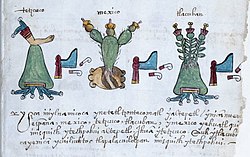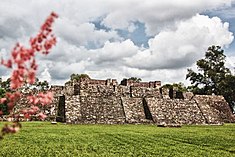
Back Altepetl BAR Altepetl Esperanto Altépetl Spanish Altepetl French Altepetl ID Altepetl Italian アルテペトル Japanese ალტეპეტლი Georgian 알테페틀 Korean अल्तेपेत्ल Marathi

 |
| Aztec civilization |
|---|
| Aztec society |
| Aztec history |
The altepetl (Classical Nahuatl: āltepētl [aːɬ.ˈté.peːt͡ɬ] , plural altepeme[1] or altepemeh) was the local, ethnically-based political entity, usually translated into English as "city-state," of pre-Columbian Nahuatl-speaking societies[2] in the Americas. The altepetl was constituted of smaller units known as calpolli and was typically led by a single dynastic ruler known as a tlatoani, although examples of shared rule between up to five rulers are known.[3] Each altepetl had its own jurisdiction, origin story, and served as the center of Indigenous identity.[4] Residents referred to themselves by the name of their altepetl rather than, for instance, as "Mexicas."[5] "Altepetl" was a polyvalent term rooting the social and political order in the creative powers of a sacred mountain that contained the ancestors, seeds and life-giving forces of the community.[6] The word is a combination of the Nahuatl words ātl (meaning "water") and tepētl (meaning "mountain"). A characteristic Nahua mode was to imagine the totality of the people of a region or of the world as a collection of altepetl units and to speak of them on those terms.[7]: 36 The concept is comparable to Maya cah and Mixtec ñuu. Altepeme formed a vast complex network which predated and outlasted larger empires, such as the Aztec and Tarascan state.[4]
Established altepeme were characterized by a central temple dedicated to a patron god particular to the identity of the altepetl and a central market. Altepeme were typically multiethnic and communal cohesion was often maintained through territorial exclusiveness.[3]
- ^ Cite error: The named reference
Licate1981was invoked but never defined (see the help page). - ^ Smith 1997 p. 37
- ^ a b Cite error: The named reference
Seiferle2007was invoked but never defined (see the help page). - ^ a b Cite error: The named reference
Crewe2019was invoked but never defined (see the help page). - ^ Cite error: The named reference
Mundy2012was invoked but never defined (see the help page). - ^ Cite error: The named reference
Noguez2001was invoked but never defined (see the help page). - ^ Cite error: The named reference
Sousa1998was invoked but never defined (see the help page).
© MMXXIII Rich X Search. We shall prevail. All rights reserved. Rich X Search